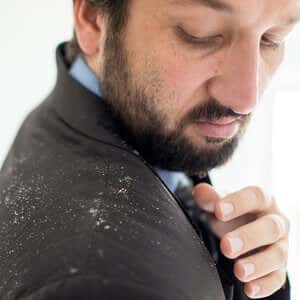
Have you ever heard of beard flakes? Some men find that the skin on their cheeks and chin under their beard is itchy and flaky. As a result, they are embarrassed to discover that they may have white flakes of skin in their beards as well as on their shirt fronts. What can be done?
Getting Rid of Beard Flakes:
Q. I get bad beard flakes. I also get flaky dry skin and redness on my temples, the bridge of my nose and my forehead. I use Cetaphil cleanser but would love to get rid of the flakes.
Seborrheic Dermatitis as a Cause of Beard Flakes:
A. What you are describing sounds suspiciously like seborrheic dermatitis. Your dermatologist can determine if that is really what is going on.
Seborrheic dermatitis causes flaking, itching and redness on the face and scalp. It is most prominent across the forehead, around the eyebrows, beside the nose and chin. Beards and mustaches are also susceptible.
The Yeast Behind the Flakes:
Dermatologists believe that seborrheic dermatitis is caused by oil-loving yeast called Malassezia (Han et al, Annals of Dermatology, June 2017). They may recommend treatment with a mild steroid cream such as hydrocortisone or with an antifungal medicine (Balighi et al, International Journal of Women’s Dermatology, Dec. 2016).
Malassezia is susceptible to the same types of antifungal compounds, such as clotrimazole or miconazole, found in dandruff shampoo or athlete’s foot treatments. Topical hyaluronic acid gel may also control the yeast (Schlesinger & Rowland Powell, Journal of Clinical and Aesthetic Dermatology, May 2014).
Home Remedies for Beard Flakes:
Some readers of this column have reported success treating facial flakes with milk of magnesia, Noxzema, Listerine or half-strength vinegar. Even Vicks VapoRub, with its mix of antifungal herbs, may work, although that would probably be much too greasy to use on a beard. Other readers are enthusiastic about a simple sea salt wash to soothe seborrheic dermatitis and banish beard flakes.
Some people find that diet makes a difference. A diet low in processed carbs and sugars seems to discourage facial yeast for them. While this connection has been studied in dogs, we are not aware of research demonstrating that diet changes susceptibility to yeast in humans (Di Cerbo et al, Veterinary Research Communications, March 2016).

